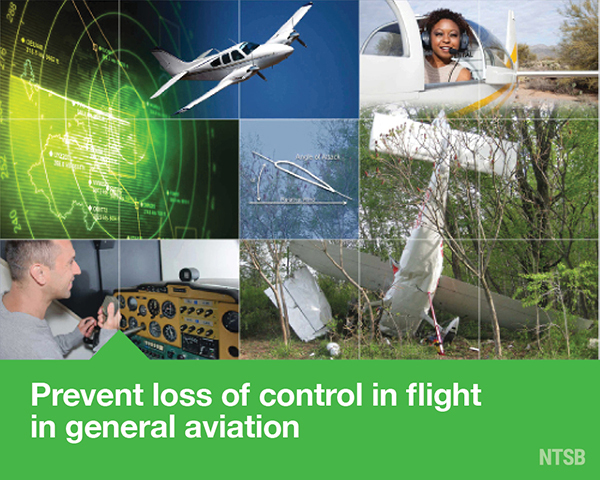
For the fourth consecutive year the National Transportation Safety Board (NTSB) has placed Prevention of “Loss of Control in Flight in General Aviation” as one of the top ten areas of focus for improving transportation safety. Every year since 2015, the NTSB has placed this on their top ten list of Most Wanted areas of improvement — a list which focuses on the most critical threats to safety in all areas of transportation including aviation.
In a mid-term update of the 2017-2018 Most Wanted list, the NTSB verified the continued listing of Loss of Control In-flight (LOC-I) for 2018. Despite the fact that the fatal accident rate in general aviation is on track to drop below one per 100,000 flight hours for the first time in history, LOC-I is considered by the NTSB to be the leading cause of fatal accidents in every segment of aviation. This contrast in statistical evidence, with the accident rate declining while LOC-I remains stubbornly at the top of the list, demonstrates two conflicting facts: 1)pilots in the normal envelope may be safer than they have ever been in history, but 2) these same pilots are not being prepared to meet the challenges that they may face when they inadvertently find themselves beyond the range of the normal envelope. While airplane upsets are rare, they are exceedingly lethal. Traditional civilian licensing requirements are focused entirely within the narrow boundaries of the normal flight, not those encountered when confronted by an unexpected airplane upset event.
Aerodynamic considerations and pilot techniques required in an airplane upset event can be extremely counter-intuitive to pilots experiencing an escalating upset event, and the human factors affecting pilots in an unanticipated upset can significantly affect their performance. Without previous real-world training in how to identify and appropriately respond to an airplane upset, pilots are often unable to identify required recovery responses in the time available, which Boeing and NASA studies indicate is often 10 seconds or less.
There is a widely held belief among pilots that as long as they receive all the training currently required by regulatory agencies such as the FAA, they will be “safe”. Often, however, required training tasks are historical in nature and do not reflect threats as they exist today. Despite the consistent placement of LOC-I as the leading cause of fatalities in every segment of aviation for many years in a row, there have been few changes to training reflecting the increased contribution of LOC-I to the number of fatal accidents or its position as the leading cause of fatalities. It is up to individual pilots or flight operations to recognize these facts and mitigate the threat through training with an experienced and recognized UPRT provider.
Nearly half of all general aviation accidents are caused by LOC-I. In order to prevent airplane upsets leading to loss of control, the NTSB confirmed that they must prevent unintended departures from flight and better manage stalls. They stated that in order to do this pilots need more training (Upset Prevention and Recovery Training, or UPRT) and a better awareness of the technologies that can help prevent these tragedies. The training required to mitigate airplane upsets and LOC-I is well understood, but is not currently mandated in the United States. The solution, comprehensive UPRT, has been recognized and identified by the International Civil Aviation Organization (ICAO) and is now recommended by them for all pilots worldwide. As the NTSB and others continue to raise awareness of the threat of LOC-I, we hope that more pilots will heed their call for training in UPRT, resulting in the future removal of LOC-I from their list of concerns.




Comments: